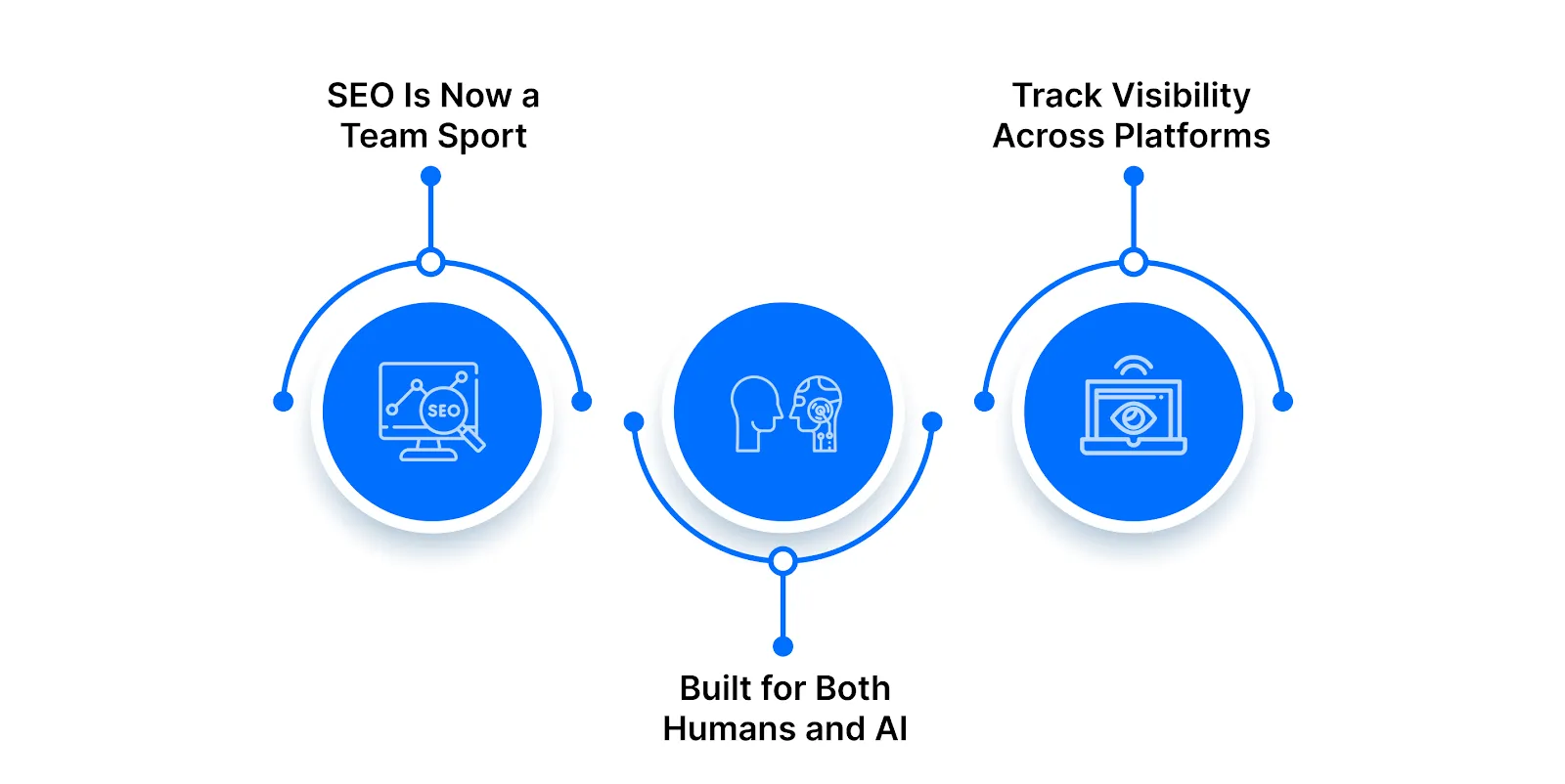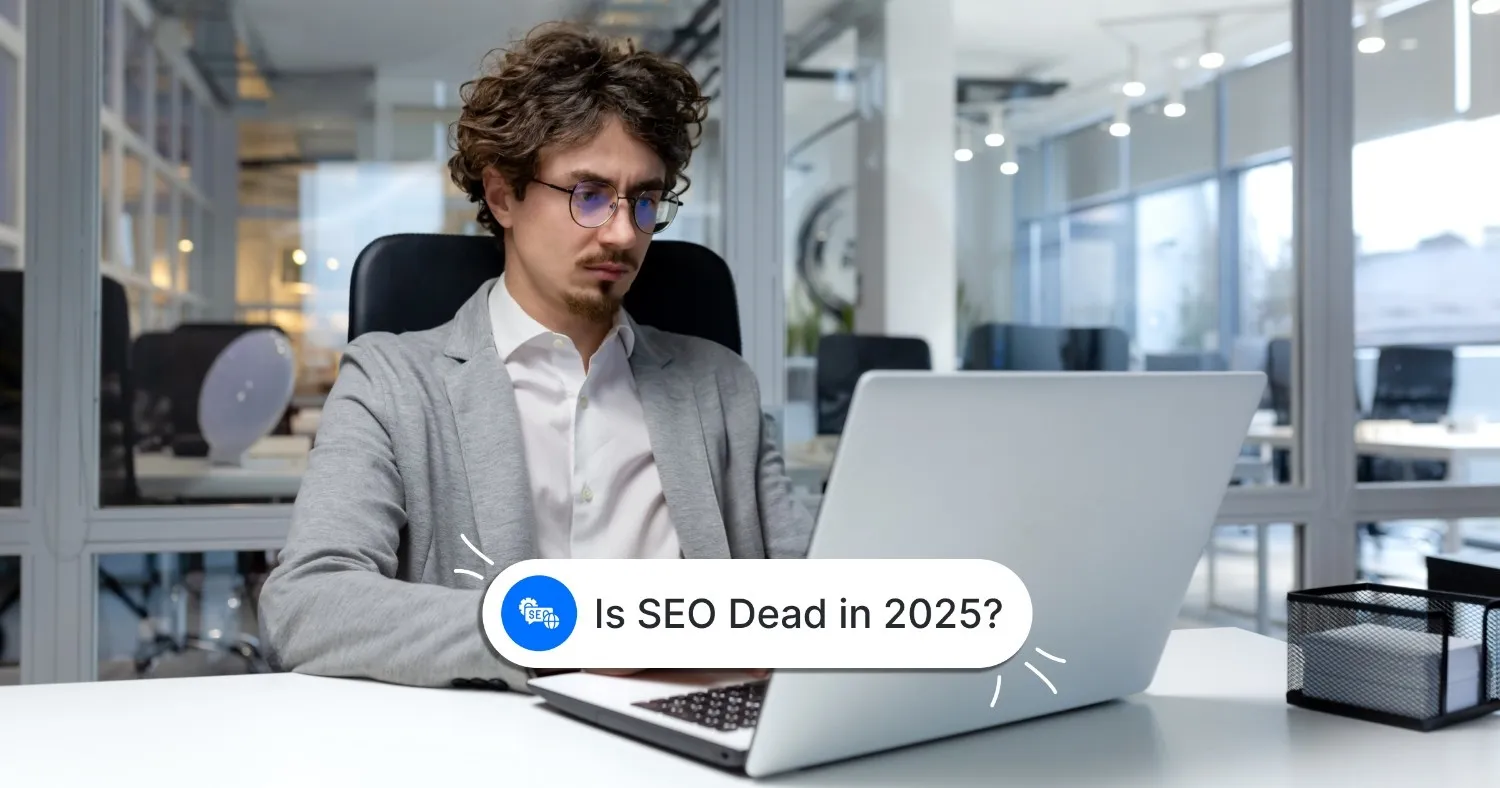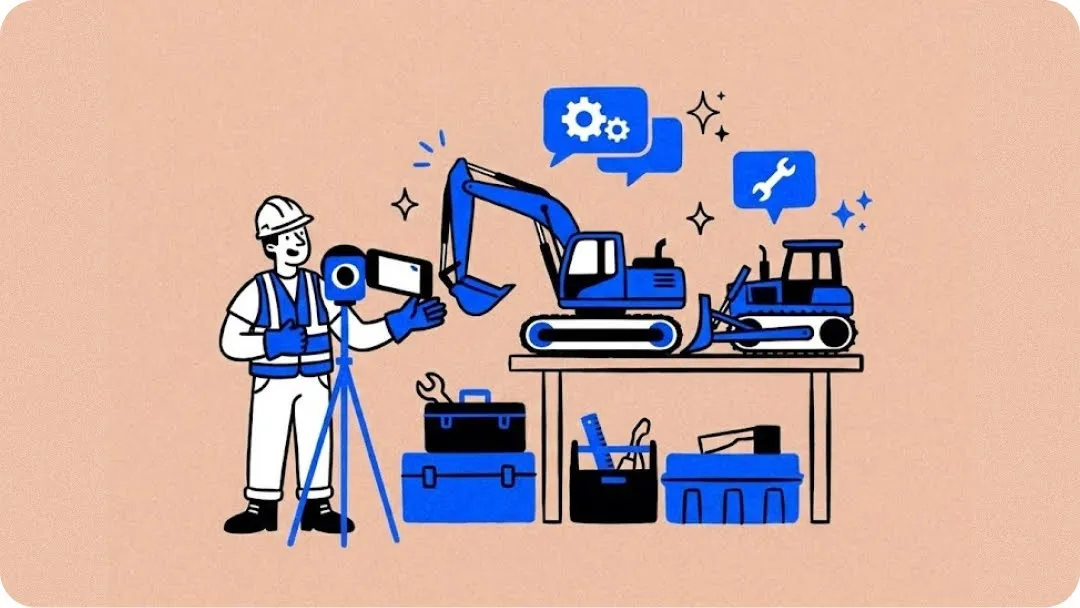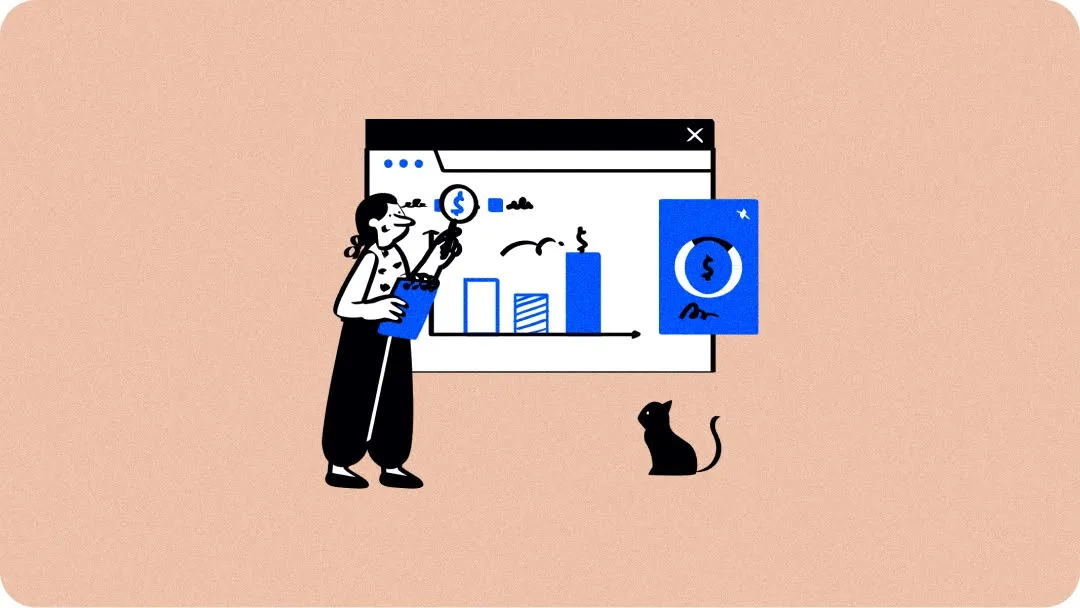TL;DR
- The rise of AI tools like ChatGPT, zero-click searches, and AI Overviews has reduced traditional web traffic, but not the need for search visibility.
- Brands now compete with models that synthesize content from multiple sources, replacing clicks with answers.
- Entity-based and semantic search dominate rankings. Google now prioritizes topic depth, expertise, and contextual relevance over exact keyword matches.
- Core SEO pillars like content quality, technical foundations, and backlinks still work. But they must now serve both human users and AI systems.
- Start by auditing your SEO for AI readiness. Evaluate whether your content is structured, citation-worthy, and optimized for inclusion in AI-generated answers, not just traditional rankings.
You’ve seen the headlines, heard the debates, and maybe even questioned your own SEO strategy. “Is SEO finally dead?” In 2025, the question feels more urgent, and for good reason.
Zero-click searches have reached an all-time high of 65% across all query types, and AI tools like ChatGPT now answer 54% of prompts without using any web search at all. Long, conversational queries are replacing short keywords, and traffic is declining across top-of-funnel content.
If you lead marketing at a search-reliant, growth-focused company, these shifts can feel alarming. Your pipeline depends on discoverability, but the rules are changing fast.
Here’s the truth: SEO isn’t dead. But it is evolving. The companies winning right now haven’t abandoned search; they’ve adapted. To stay visible, you need to understand what’s changed, what still works, and how to build for AI-powered discovery.
Why People Keep Asking If SEO Is Dead
The "SEO is dead" debate isn't new, but the reasons behind it keep shifting with each technological advancement. Understanding why this question persists helps you separate genuine concerns from industry noise. The latest wave of skepticism stems from AI's rapid integration into search, creating visibility challenges that feel unprecedented.
A Brief History of the "SEO Is Dead" Myth
SEO has supposedly "died" at least six times in the past two decades. Google's Panda update in 2011 killed content farms and sparked the first major death announcement. Penguin followed in 2012, targeting link schemes and convincing many that traditional SEO tactics were finished.
Social media's rise led to another wave of obituaries. Marketers claimed Facebook and Twitter would replace search engines entirely. Then mobile came along, followed by voice search, each triggering new rounds of "SEO is over" predictions.
The pattern reveals something important: SEO doesn't die, it adapts. Each major shift forces practitioners to abandon outdated tactics and develop new approaches. The 2025 debate follows this same pattern, driven by AI's integration into search experiences.
History shows us SEO always adapts to major shifts. But 2025 introduces new factors that feel more disruptive and more urgent for marketers.
Recent Triggers for the 2025 Debate
If your strategy is still focused only on classic keyword rankings, you're falling behind. AI-powered discovery is already rewriting the rules of SEO.
Three specific developments fuel today's SEO anxiety.
- Google’s AI Overviews are stealing the spotlight.
These AI-generated summaries dominate search results for informational queries, reducing organic traffic by 15% to 25% across industries.
Recent 2025 click-through rate (CTR) studies show that local search results, such as the "local pack" for business listings, receive significant user clicks. For example, the top position in the local pack gets a CTR of 17.6%, with the second and third positions at 15.4% and 15.1%, respectively
- AI assistants are replacing traditional search.
The 2025 G2 Buyer Behavior Report confirms that AI assistants like ChatGPT, Claude, and Perplexity are fundamentally changing the B2B software research process. According to G2, 79% of global B2B buyers say AI search has changed how they conduct research, and AI is now an essential part of the research and evaluation stages of the buying journey
Your brand faces a visibility crisis if you're still optimizing solely for traditional Google rankings while ignoring these AI-powered search behaviors.
So what exactly is different now? Let's break down the core shifts transforming how search works in 2025.
What's Changing in SEO

The SEO changes happening in 2025 run deeper than algorithm updates or new ranking factors. Search behavior itself is transforming as AI becomes the primary interface between users and information. Understanding these shifts helps you adapt your strategy before competitors recognize what's happening.
1. AI-Generated Answers Are Replacing Web Visits
AI engines like ChatGPT and Perplexity synthesize content from multiple sources to deliver full answers, no click required. As of mid-2025, ChatGPT handles over 1 billion queries per day, according to multiple industry sources and OpenAI statements. Some projections even suggest the number could reach 2–3 billion daily queries in the near future
Top-of-funnel content like “What is X” or “Best tools for Y” now competes with models trained to combine info from dozens of sources.
- SaaS brands report a 25% organic traffic drop to comparison pages.
- Healthcare and finance sites see declines in symptom-related and educational content views.
2. Shift Toward Entity and Semantic Search
Google no longer relies solely on keywords; it reads for meaning. By recognizing entities and topic relationships, it ranks pages based on expertise and depth.
For example, a local HVAC brand gains visibility not just by ranking for “furnace repair,” but by becoming recognized as an expert in “residential heating systems” as a whole.
Comprehensive coverage matters more than exact-match phrases. Related queries like “best project management tool for startups” and “how to manage remote teams” are treated as contextually connected.
3. Ranking Factors Now Prioritize Authority and Satisfaction
SEO in 2025 revolves around EEAT: Experience, Expertise, Authoritativeness, and Trustworthiness. Keyword stuffing won’t help if users bounce quickly or don’t engage.
Google now evaluates:
- User engagement metrics like time on site and bounce rate
- Brand citations from trusted sources (media, customers, social)
- Mentions by AI assistants that recognize your authority in a niche
Core Web Vitals remain important, but Google now evaluates them alongside content helpfulness scores. A technically perfect page with unhelpful content ranks lower than a slower page that genuinely solves user problems.
Despite all the changes, not everything has been tossed out. Some principles remain as relevant, and powerful, as ever.
What Still Works in SEO (And Always Will)
While search technology evolves rapidly, fundamental SEO principles remain effective because they align with what users want: helpful, accessible, trustworthy information. Smart marketers focus on these enduring elements while adapting their execution to new search behaviors.
1. Content That Serves Real User Intent
High-quality, problem-solving content never goes out of style. AI is better than ever at spotting thin or redundant pages, so your content must answer complete questions and offer genuine value.
Don’t just list keywords, solve real problems. A user searching “CRM software for real estate” wants comparisons, use cases, and implementation tips tailored to their industry.
Topical authority matters more than scattered content. Focus on building clusters, like “SEO,” “content strategy,” and “paid search”, that reinforce your expertise across related themes.
2. Technical SEO That Supports Discovery
Your content only matters if search engines can find and understand it. That’s where technical SEO plays its ongoing role.
- Page Speed: Load times under 2.5 seconds improve rankings and user experience.
- Mobile-First Design: Google now evaluates your site based on its mobile version.
- Schema Markup: Structured data (like FAQ or product schema) boosts visibility in AI Overviews and featured snippets.
- Clean Site Architecture: Use internal links, XML sitemaps, and crawl directives to guide both bots and users to your best content.
3. Backlinks and Brand Mentions Still Matter
Links remain a top-ranking factor, but quality beats quantity. A relevant backlink from an industry blog holds more weight than a generic high-authority domain.
And now, even unlinked brand mentions help build your entity authority. If your brand is cited in trusted content, whether through podcasts, articles, or forums, Google treats it as a credibility signal.
Focus on earning mentions by publishing research, helpful tools, or expert commentary. The stronger your content, the more likely others will reference it organically.
The relationship between backlinks and brand authority creates a positive cycle: stronger brands earn more quality links, which increases their authority and attracts additional high-value citations.
While those fundamentals still matter, your SEO strategy needs a serious update if you want to compete in today’s AI-first search environment.
The New Priorities for SEO in 2025

Traditional SEO tactics won't disappear overnight, but successful brands are adding new optimization approaches that account for AI-powered search behaviors. These priorities complement existing SEO efforts while preparing your brand for continued search evolution.
1. Optimize for Zero-Click and AI-Powered Search
Zero-click searches now dominate. Instead of clicking, users get answers directly from featured snippets, AI Overviews, or voice assistants, meaning visibility, not traffic, becomes your top goal.
Make your content AI-friendly:
- Use clear headings, bullet points, and concise answers
- Structure information for easy extraction
- Apply schema markup (FAQ, How-to, Product) to boost inclusion in AI responses and voice results
Write naturally, but include the facts AI tools need: stats, quotes, definitions, and FAQs. The more structured and scannable your content, the more likely AI will cite it.
2. Target Conversational and Long-Tail Queries
AI and voice search have changed how people search. We now ask full questions like, “What’s the best CRM for a small e-commerce business?”
To rank, match how people actually speak:
- Use question-based subheadings
- Write in natural, readable language
- Include full-sentence answers, not just keyword phrases
Long-tail queries bring higher intent and lower competition. Focus on phrases like “content strategy for early-stage startups” or “email automation for B2B lead nurturing.”
FAQs are especially powerful. Build sections around real user questions (not jargon) to capture AI and voice-driven traffic. Local businesses should get specific, cover things like hours, insurance, and service areas in everyday language.
This is where Generative Engine Optimization comes in, bridging traditional SEO with how AI systems now surface and recommend information.
Blending SEO with GEO (Generative Engine Optimization)
Generative Engine Optimization represents SEO's evolution for AI-powered search. While traditional SEO focuses on ranking in search results, GEO aims for inclusion in AI-generated answers and recommendations.
AI assistants like ChatGPT and Perplexity favor structured, well-sourced content. To earn citations, your content must offer:
- Comprehensive coverage of the topic
- Clear, factual statements and cited data
- Proper HTML and schema formatting
Treat AI visibility as a separate performance metric. Tools like Gushwork's AI Search Grader, show how often AI platforms reference your brand, insights that traditional SEO tools miss.
To succeed in GEO:
- Write for both users and machines
- Keep messaging and data consistent across your site, social profiles, and listings
- Ensure brand attributes (like services, expertise, and contact info) are easily extractable
Brand consistency across all digital touchpoints becomes critical for AI recognition. Ensure your business information, key messages, and expertise areas remain consistent across your website, social profiles, and third-party listings.
Adapting to this shift isn't just about better content, it's about reshaping how your entire team thinks about visibility and digital presence.
What SEO in 2025 Means for Marketers

Modern SEO is no longer siloed. It’s a cross-functional strategy that blends content, technical precision, brand authority, and AI visibility into one unified effort. Marketers must now coordinate across content, product, PR, and engineering teams to stay competitive.
1. SEO Is Now a Team Sport
Your content team creates optimized articles. Your PR team builds brand authority. Your developers ensure schema, speed, and mobile-friendliness. Even customer support and social media impact your visibility through entity signals and reputation.
SEO today touches every department and works best when aligned with business goals, sales priorities, and brand messaging.
2. Built for Both Humans and AI
Your strategy must serve both people and machines. Human users want engaging, useful experiences. AI platforms need structured, factual, well-attributed content to parse and cite accurately. Striking this balance is what drives discovery across search engines and AI assistants.
3. Track Visibility Across Platforms
Success now requires tracking both traditional SEO metrics and AI performance indicators, from organic traffic to AI citations, Knowledge Graph presence, and voice search results. This dual visibility ensures you're discoverable in all the places modern users search.
Final Thoughts
SEO in 2025 demands more sophistication than keyword stuffing and link building ever required. The discipline has matured into a comprehensive approach to digital visibility that accounts for human behavior, AI capabilities, and evolving search technologies. Brands succeeding in this environment don't abandon traditional SEO principles; they expand them.
They create content that serves both human readers and AI systems. They build authority through expertise demonstration rather than manipulation tactics. They optimize for user intent rather than just keyword rankings. The marketers asking "Is SEO dead?" are often those clinging to outdated tactics while competitors adapt to new realities.
Your next step depends on your current SEO approach. Audit your strategy against 2025 requirements: Are you visible to AI search tools? Does your content answer complete questions? Are you building genuine expertise and authority? Book an appointment with our AI optimization experts to future-proof your search strategy today.




















.webp)








.webp)
.svg)


.svg)
.svg)
.svg)




.svg)


